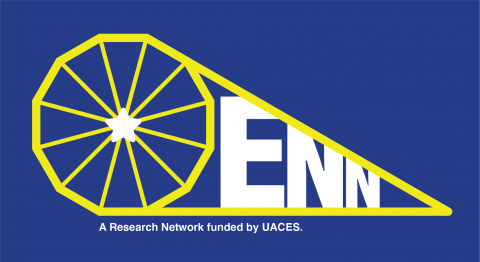European Nonviolence Network (ENN)
About
This research network is the new platform for an engaged and impactful discussion on the potential of nonviolence in 21st Century Europe. We produce and discuss findings, engage activists and decision-makers, promote high-level dialogues and co-produce knowledge for training and education. We welcome and encourage contributions from all disciplines, from the social sciences to philosophy, from history to psychology and STEM. Our network provides a European platform for innovations in the field, and in-depth discussion of the history, present and future of nonviolence in Europe. We don’t want this discussion to be exclusively academic – our aim is to build on our contacts with the networks of nonviolent activists, civil society organisations, Members of the European Parliament, former and current MPs, the EU, the Council of Europe and OSCE-ODHIR institutions.
From 2020-2023, UACES Research Networks were supported by the Erasmus+ Programme of the European Union.

Nonviolence is a pillar of the history and the present of Europe and the European Union. It contributed to the construction of Europe against Nazi and fascist dictatorships. It played a key role in the many revolutions, from Portugal to Czechoslovakia, from Poland to the Baltic States. Amidst the violence of the Balkans war, nonviolence decisively contributed to the liberation of Serbia from the yoke of Milosevich. The ‘nonviolent revolutionary spirit’ moved eastwards, to Georgia, Ukraine and in these days Belarus. Besides, nonviolence has a story within the institutions, such as the Council of Europe resolution on the creation of a European award of Non-violence, the EP resolution of the 8 May 2008 on the Annual Report on Human Rights in the World, the report ‘Nonviolent Civic Action in Support of Human Rights and Democracy’ in 2009, and the OSCE Guidelines on Freedom of Peaceful Assembly
Yet, the social scientific and policy-oriented debate on nonviolence has been limited. The European Union received a Nobel Peace Prize but has been somewhat hesitant to embrace nonviolence as vision in domestic, foreign and development cooperation policy so far. Even less has been done in Europe (compared to North-America and India) on the difference between pacifism and nonviolence, and between renouncing to violence and nonviolent political and social struggle.
There are different organisations working at the national and local level, but this is the transnational UACES-supported platform to engage and create capacity to understand and advance nonviolence.
Information about ENN events and publications will be published shortly.
JOIN US – Please join to receive news and updates and become member of the network, there are no fees. Contact [email protected] to join.
Our Logo
This logo refers to the Gandhian Khadi, symbol of revolution and full independence. The 12 spokes symbolize the 12 stars of the EU flag. The star on the hub represents nonviolence. The aim of the network is to show how nonviolence can put the wheel of EU unity, solidarity and harmony in motion again. We thank Melina Dieckgräber for the help in designing the logo.
Our Narrative Report
To view the highlights of our project, in reverse chronological order, starting from the international conference and its legacy, click here.
- The network is now on the School of Transnational Governance list of initiatives.
- Presentation: Nonviolence, negotiation and transnational policy: what does nonviolent resistance bargain for, how and why?, by Baldoli and Radaelli, part of the course ‘Negotiating International Transformations’ – slides here (EUI 8th March 2021)
- Book Chapter: A nonviolent narrative for European integration? Contrasting populist and nonviolent narratives by Baldoli and Radaelli, in MD Jones and L Shanahan M McBeth (Eds.)The Science of Stories Episode 2 (working title) University of Montana Press.
- Article: Foundations of Regulatory Choice: Precaution, Innovation … and Nonviolence? By Baldoli and Radaelli, will be part of the special issue: The Limits of EUrope: (Dis-)Integration, (Anti-)Political, (Mis-)Trust, (Non-)Science, and (Mis-)Communication. Revisiting the legitimization of EUropean politics beyond populism and technocracy, JCER *under review, available on request.
- Book Chapter: Diritto alla scienza e precauzione by Baldoli and Radaelli (Chapter in Italian to appear in print in June 2021)
- Presentation: Testing Europe’s Democratic Legitimacy In The Covid-19 Crisis, by Baldoli and Radaelli (Robert Schuman Centre EUI, 16 February 2021) abstract to come.
- Presentation: Contribution to the event organised by Partito Radicale for ML King Day 2021 (available here).
- Podcast: Corona-Virus: the role of nonviolence By Baldoli and Radaelli (In Italian, with Marco Perduca – May 2020)
- Blog post: Nonviolence and COVID-19: A force already more powerful? By Baldoli and Radaelli, (published by CANVAS – Centre for Applied Nonviolent Action and Strategies – 31 March 2020).
- Book Chapter: Evidence-based policy and the precautionary principle: Friends or foes? In: The Freedom of Scientific Research (MUP 2020)
- Presentation: ‘Foundations of Regulatory Choice: Precaution, Innovation and …Nonviolence?’ By Baldoli and Radaelli (UACES Virtual Conference 2020).
- Presentation: ‘Populist and Nonviolent Narratives of the EU’ , by Baldoli and Radaelli (UACES, 2019).
- Blog post: The Pope’s Buona Novella is Nonviolence ( in Italian, 2019)
- Article: ‘What has Nonviolence got to do with the EU?’ by Baldoli and Radaelli, published by the Journal of Common Market Studies.
- Book: Reconstructing Nonviolence: a New Theory and Practice for a Post-secular Society’ by Roberto Baldoli published by Routledge.

